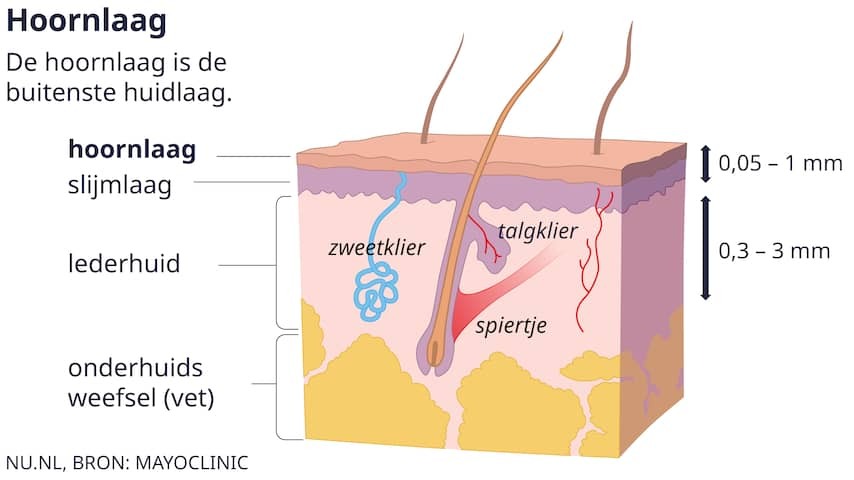Applying retinol combats wrinkles. At least: that’s constantly recommended on TikTok. But what exactly is retinol, and is it harmful if you apply it a lot?
Open TikTok, and you’ll see it: teenage girls applying all sorts of products to their faces every day. Products with retinol are especially popular. That’s a form of vitamin A, with which they hope to prevent the development of wrinkles.
Jetske Ultee, a research physician in cosmetic dermatology, also sees that the ingredient in cosmetics is popular because of its skin-rejuvenating properties. “But a teenager doesn’t need that yet, of course. Retinol is mainly suitable for older and thinning skin.”
It improves the healthy cell division of your skin, and it stimulates the production of collagen and elastin, says Folkert Blok, dermatologist at Allergie Centra Nederland. These are substances that firm and make the skin resilient. “As a result, wrinkles can diminish,” Ultee adds.
Your connective tissue also plays a role. A face with enough connective tissue stays tighter and wrinkle-free for longer. As you get older, you produce less collagen and elastin. Retinol can then help: it has a fairly direct effect on the epidermis and also has a strengthening effect on your connective tissue, Blok knows.
Sun protection becomes even more important
Be careful with applying too much of this product. It makes your skin sensitive to UV light. “That makes sun protection even more important,” says Ultee. “Applying retinol ensures that the stratum corneum of your skin becomes less thick,” Blok adds. That stratum corneum provides protection. If that layer becomes thinner, it makes your skin more vulnerable.
Currently, care products with a high concentration of retinol (from 0.4 to 1 percent) are still available in stores. But this will soon change due to new European rules. This has to do with concerns about ingesting too much vitamin A.
This vitamin is also found in foods such as fish, eggs, and dairy products. You need this vitamin, but too much is not good. “Research shows that too much vitamin A can lead to osteoporosis, or bone loss,” says Ultee. “This is especially a risk for women in menopause. And they happen to be the biggest users of anti-aging products.”

The risk of too much vitamin A
But the main reason to limit the concentration of vitamin A is the cumulative effect that occurs in the body, says Blok. Especially in the liver. It could cause too much fat in the liver cells and eventually lead to liver inflammation. Pregnant women also run the risk of coming into contact with a substance that can cause abnormalities in the fetus.
Therefore, the concentrations in skin care products are limited. So it is not that you will not be able to buy any retinol products at all in the future. Only from 2027, they will be creams with a less high concentration (0.05 percent in body products and 0.3 percent in other care products.)
Does retinol with a reduced concentration still have an effect? Ultee has her doubts about that. Not only because products with retinol were previously tested with a higher concentration of this substance. Also because the conditions in a laboratory are not comparable to daily life.
Retinol in open jar quickly loses its effect
“The ingredient loses its effect as soon as air or (sun) light is added. Just like by water and the reaction of oils (in which retinol is dissolved) with oxygen from the air.” Precisely because of that rapid decay, research is often done with ‘fresh’ retinol. “While the products in stores are already on average a year old.”
In addition, packaging must be light- and airtight (which is often not the case), otherwise retinol will still lose its effect within a few days after opening. There are products that meet this, and where you are more likely to see results. Yet even then, it is still questionable whether you will see an effect, since the minimum required concentration is often not in it.
Ultee therefore advises to leave products with retinol. And if you still want to apply it, be careful. “Try not to use a retinol product every day, but gradually build it up to let your skin get used to it. If you suffer from redness or flakes, consider another product.” For example, a cream with vitamin C or hyaluronic acid.
Does preventive application exist?
For teenage girls, retinol does not do so much against wrinkles. But does preventive application exist? That is difficult to say, says Folkert Blok, dermatologist at Allergie Centra Nederland. “Then you would have to follow someone from their teenage years for years to determine whether they have gotten wrinkles or not.”
Another advantage of retinol is that it also works well against clogged pores, a rough skin texture, pigment spots, and acne. Teenage girls can therefore benefit from this. But on sensitive skin, retinol can be counterproductive.
And good to know: how quickly you see results differs per person. Blok: “Be patient, skin rejuvenating effects often only occur after a few months.”